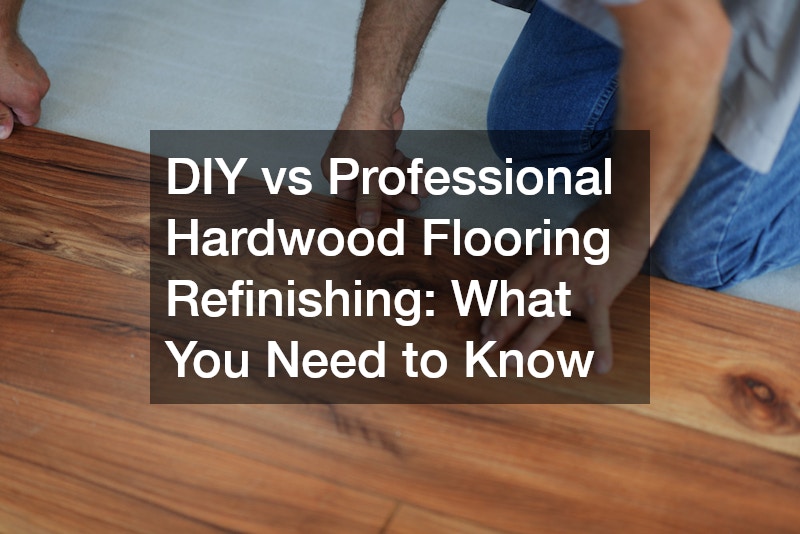Hardwood floors add warmth, elegance, and value to any home. Over time, though, they can become scratched, dull, or worn out, making refinishing a necessary step to restore their original beauty. Homeowners often face a choice: tackle the project themselves or hire a professional. Both options come with pros and cons, and understanding these differences is essential before committing to a path. In this article, we break down the factors you need to consider when deciding between DIY and professional hardwood flooring refinishing.
The Appeal of DIY Hardwood Flooring Refinishing
Many homeowners are drawn to the idea of doing it themselves. A DIY approach can save money and provide a sense of accomplishment.
Equipment like sanders, buffers, and stains is widely available for rent or purchase, making it accessible for those willing to invest the time.
A major benefit of DIY is cost savings. Hiring professionals can be expensive, especially if your home has a large area of hardwood flooring. Doing the work yourself eliminates labor costs, leaving only materials and equipment rentals as your primary expenses.
Additionally, DIY projects give homeowners full control over the process. You can choose the type of finish, stain color, and sanding technique that aligns with your vision. This level of personalization can be rewarding, especially for those with a creative touch and patience for detail.
However, DIY hardwood flooring refinishing isn’t without challenges. It requires skill, careful planning, and significant physical effort. Mistakes such as uneven sanding, staining errors, or poor finish application can be costly to fix. Homeowners should honestly assess their ability to handle the project before committing.
Why Hire a Professional
Professional hardwood flooring refinishing offers convenience and expertise. Experienced technicians bring knowledge of proper sanding techniques, dust control, stain application, and finishing methods. This expertise reduces the risk of mistakes and ensures a high-quality outcome.
Another advantage is efficiency. Professionals have access to industrial-grade equipment that can complete the job faster and more effectively than consumer-grade tools. What might take a weekend or longer for a DIYer can often be completed in a day or two by a professional team.
Professionals also provide warranties or guarantees, giving homeowners peace of mind. If any issues arise after the refinishing, many companies will address them at no additional cost. This can be especially valuable for those who want a long-lasting, flawless finish without the stress of potential errors.
While the cost of hiring a professional is higher, it can be considered an investment. High-quality hardwood flooring refinishing done correctly can increase the home’s value and longevity, saving money in the long run by avoiding costly repairs or redo projects.
Key Considerations Before Making a Decision
Choosing between DIY and professional refinishing depends on several factors. First, consider your budget. If saving money is a top priority and you’re confident in your skills, DIY might be appealing. Conversely, if your budget allows and you want a guaranteed result, professional services are likely the safer option.
Second, think about the scope of the project. Small areas or individual rooms may be manageable for DIY, but larger spaces or floors with extensive damage might benefit from professional attention.
Third, evaluate your available time and physical capability. Refinishing hardwood floors is labor-intensive and can be messy. Sanding, staining, and sealing floors require stamina, patience, and proper ventilation. Professionals handle these challenges daily, making the process smoother and less stressful.
Finally, consider the potential resale value. Homes with professionally refinished hardwood floors often attract more buyers and can command higher prices. If your goal is to increase your home’s market appeal, professional refinishing may be the better choice.
DIY Tips for Those Who Choose to Take the Plunge
For homeowners who opt for a DIY approach, preparation is key. Begin by thoroughly cleaning and inspecting the floors. Remove furniture, rugs, and baseboards to ensure unobstructed access.
Invest in quality tools and materials, as they significantly affect the final outcome. Renting a drum sander, edge sander, and applying multiple coats of finish can make a noticeable difference in durability and appearance.
Practice proper sanding techniques to avoid uneven surfaces. Start with coarse-grit sandpaper and gradually progress to finer grits. Always sand in the direction of the wood grain, and keep the sander moving to prevent gouges.
Lastly, allow sufficient drying and curing time for stains and finishes. Rushing the process can result in streaks, bubbles, or uneven color. Patience and attention to detail are crucial for a successful DIY project.
Deciding between DIY and professional hardwood flooring refinishing requires careful consideration of cost, skill level, project scope, and long-term goals. DIY can save money and provide a rewarding hands-on experience, but it demands time, effort, and precision. Professional services, while more expensive, offer expertise, efficiency, and reliable results that can enhance your home’s value.
Ultimately, the best choice depends on your priorities and capabilities. Understanding the advantages and challenges of each approach will help you make an informed decision, ensuring your hardwood floors look stunning and last for years to come.

